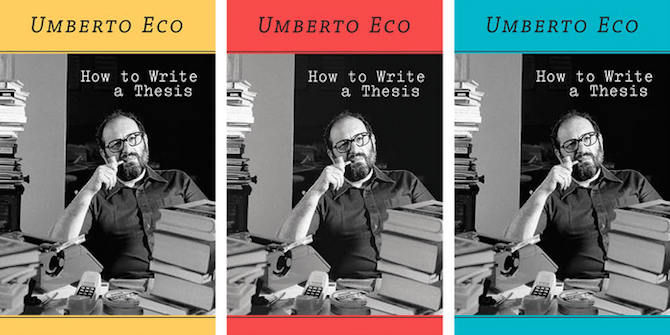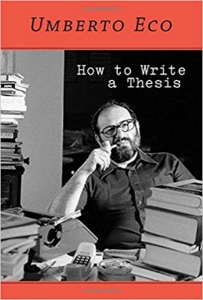
Now in its twenty-third edition in Italy and translated into seventeen languages, How to Write a Thesis has become a classic. This is its first, long overdue publication in English. Vanessa Longden thinks that in addition to its witty one-liners, Eco’s book contains the bare bones on which to build research.
How to Write a Thesis. Umberto Eco (trans. by Caterina Mongiat Farina and Geoff Farina). MIT Press. March 2015.
 The passing of time and technological developments have altered the way researchers engage and interact with their source material. In light of this, Eco’s How to Write a Thesis becomes increasingly significant and even more when one considers the publication has not been edited or revised since its release in 1977. This is unusual, particularly in a contemporary context where access to knowledge is near instantaneous and information is transient. This is not to say Eco’s book is rooted firmly in the past, but that it has stood the test of time. The publication has provided inspiration and instruction for several generations of Italian students and will continue to do so on a broader scale since its long awaited translation into English.
The passing of time and technological developments have altered the way researchers engage and interact with their source material. In light of this, Eco’s How to Write a Thesis becomes increasingly significant and even more when one considers the publication has not been edited or revised since its release in 1977. This is unusual, particularly in a contemporary context where access to knowledge is near instantaneous and information is transient. This is not to say Eco’s book is rooted firmly in the past, but that it has stood the test of time. The publication has provided inspiration and instruction for several generations of Italian students and will continue to do so on a broader scale since its long awaited translation into English.
This book will not tell you what to write and Eco is more than frank about this: if you are after a ‘quick fix’ then you should not undertake a PhD, as you would be pursuing it for the wrong motivations. What Eco provides, in addition to witty one-liners – “You are not Proust. Do not write long sentences”; and “You are not e.e. cummings…you are not an avant garde poet” – are the bare bones on which to build research. Eco highlights different avenues of investigation and presents the demands and commitments – ranging from financial motivations to more personal attributes like the candidate’s age and maturity – which may affect students and their research as they embark on their academic careers.
Undertaking independent research should be an adventure: “If you write your thesis with gusto, you will be inspired to continue,” says Eco. Your thesis will not be an easy journey, nor should it be. The publication acts as a methodical guide which clarifies ‘The Definition and Purpose of a Thesis’; choosing a respective topic (be it a Monograph or Survey, Historical or Theoretical, Ancient or Contemporary); and through to conducting research and writing the final piece. Your thesis should ultimately “activate your intellectual metabolism” and leave you hungry for more.
Eco does not disappoint, he wrote this book for a hypothetical student without any experience and this is important to remember. It is all too easy to be swept along by Eco’s dynamic thought process. For instance, he demonstrates in An Experiment in the Library of Alessandria that students are still able to construct a preliminary bibliography using limited library resources and within a narrow timeframe (nine hours to be exact). Here, reading the rapidity of Eco’s thinking can at times be a little intimidating and students must remember that research should be taken in its stride. Reading another’s thoughts in linear progression is different to actual contemplation which can often be erratic and unexpected; but no less valuable. To put it a different way, early researchers must not be discouraged if their revelations do not appear as prompt as Eco’s. Their approach to inquiry will develop over time with critical reflection and would be partially dependent “on the researcher’s psychological structure”.
Despite developments in technology, digital word processing, and online archival and cataloguing systems, Chapter 4 appears somewhat novel in that it features reproductions of Eco’s index cards supported by his handwritten annotations, colour coding and cross-references. What he presents is a comprehensive and systematic mode of organisation, the index cards are compiled into numerous categories: bibliographic information, summary of books or articles, ideas files, and quotations to which you wish to return. This method remains beneficial as it enables students to reacquaint themselves with the tactility of their source material. Instead of becoming distanced digitally through computer screens, students’ physical interaction with their source-base plays an intrinsic relationship in the formulation of new ideas.
The best ideas may not come from major authors
This is just one of Eco’s poignant and important acknowledgements, that inspiration can be found in the most unlikely of places and may even arise from those whose ideologies and thoughts are very different from our own. Eco says, “Even the sternest opponent can suggest some ideas to us. It may depend on the weather, the season, and the hour of the day”. Such inspiration and interpretations are largely subjective; recognising this and learning to listen to others is a valuable skill to possess and should be developed as one embarks on their research. Similarly, Eco writes about ‘Academic Pride’ at the end of Chapter 5. This section concerns confidence in writing and feeling accomplished in one’s efforts and diligence.
When you speak, you are the expert…you are humanity’s functionary who speaks in the collective voice. Be humble and prudent before opening your mouth, but once you open it, be dignified and proud.
For Eco, intellectual satisfaction and stimulation, in addition to genuine interest, should be the motivators of academic research. This book is accessible enough to benefit students at various stages of their academic careers, whether at undergraduate, masters or doctoral level. It will also serve as a valuable teaching resource as Eco makes readers aware of the skills that are required in order to perform thorough and quality research. In most cases, How to Write a Thesis serves as a reminder and a token of reassurance; proposing that many readers will already possess the techniques which Eco describes. Thus this book bestows more than guidance, it makes the reader aware of their own capabilities.
Research is and remains, in Eco’s words, “a mysterious adventure that inspires passion and holds many surprises”. I could not agree more. Research can be elusive and it can bestow extraordinary clarity. People are united and divided by research. Writing is just as much a “social act” as an individual endeavour. We continue to collaborate with the texts of the past, shaping and elaborating others’ perspectives in order to expand the borders of a collective culture. Ideas coordinate, they “travel freely, migrate, disappear and reappear”. If for a time researchers are “lost in the woods” they can take solace in the fact that their surroundings will no longer appear as daunting.
Note: This review gives the views of the author, and not the position of the LSE Review of Books blog, or of the London School of Economics.







